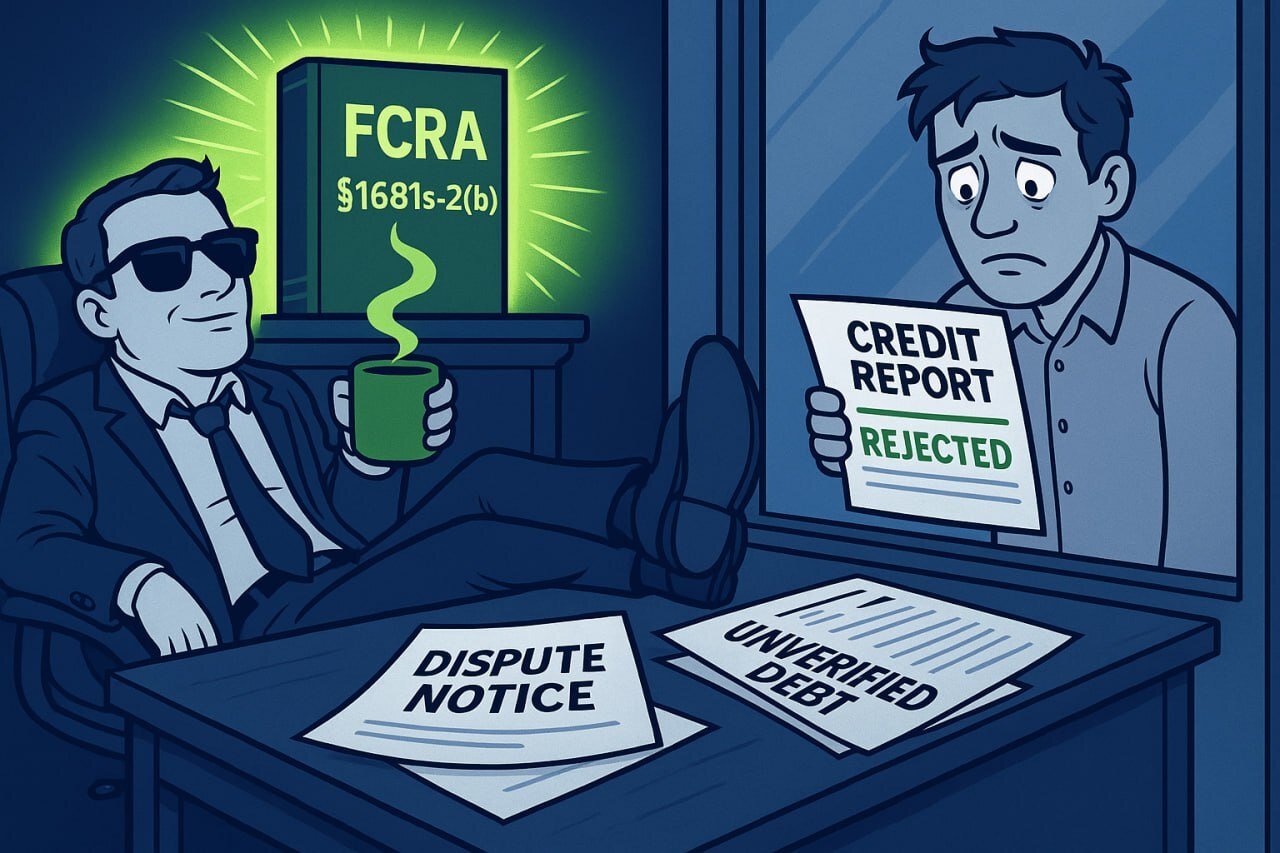FCRA Investigations and the Fourth Circuit: What Roberts v. Carter-Young Really Means
- Blog
- Current Events and Consumer News
FCRA Investigations and the Fourth Circuit: What Roberts v. Carter-Young Really Means

The Fourth Circuit’s Take on FCRA Investigations: Why the “Objectively and Readily Verifiable” Standard Should Not Undermine § 1681s-2(b)
The Fourth Circuit’s recent decision in Roberts v. Carter-Young, Inc. addresses a question that has divided courts and created uncertainty for furnishers, consumers, and practitioners alike: what kind of credit reporting disputes trigger a furnisher’s obligation to investigate under the Fair Credit Reporting Act?
Specifically, the court examined whether a furnisher must investigate disputes that allegedly involve legal, rather than factual, disagreements. The opinion is an important step forward in rejecting the artificial “legal vs. factual” dichotomy that some courts have adopted, but it raises interpretive concerns that warrant careful attention - particularly regarding how the opinion’s language about “objective and readily verifiable” inaccuracies might be misread to limit the clear textual mandate of the statute.
The underlying facts are familiar to anyone practicing in consumer law.
Shelby Roberts disputed a $791.14 debt placed on her credit report by a collection agency, Carter-Young, based on charges her landlord claimed she owed after ending her lease. Believing the charges were retaliatory and fabricated, Roberts filed disputes with the credit reporting agencies. Those agencies then notified Carter-Young, triggering the furnisher’s duty under § 1681s-2(b) of the FCRA to conduct a reasonable investigation. But Carter-Young’s sole step was to ask the landlord to reconfirm the debt. Upon receiving that confirmation, Carter-Young simply re-reported the debt as valid. Roberts eventually sued under the FCRA, alleging that Carter-Young failed to fulfill its duty to conduct a reasonable investigation. The district court dismissed the complaint, reasoning that Roberts’ dispute was legal in nature and therefore outside the scope of the FCRA’s investigatory requirements.
The Fourth Circuit reversed. Rejecting the notion that furnishers are exempt from investigating disputes that implicate legal issues, the court held that a consumer can state a claim under § 1681s-2(b) so long as they allege that the disputed information was inaccurate or incomplete in a manner that is “objectively and readily verifiable.” In so holding, the court joined a growing number of jurisdictions that view the distinction between legal and factual disputes as unworkable and contrary to the FCRA’s remedial purpose.
After all, many disputes - like whether a debt was incurred, whether a payment was made, or whether a charge was retaliatory or fabricated - have both factual and legal elements and therefore can creatively always be couched as a legal dispute. The court recognized that furnishers are not courts and should not be asked to resolve complex legal issues, but it emphasized that they are certainly capable of verifying basic facts or evaluating records sufficient to assess whether reported information can be supported.
This shift away from the unnatural factual/legal distinction is commendable.
But the court’s opinion introduces a new standard that may be misunderstood. By requiring that the alleged inaccuracy be “objectively and readily verifiable,” the opinion risks being interpreted to mean that if a claim is not verifiable in that sense, the furnisher need not do anything further. That reading would run directly counter to the plain text of § 1681s-2(b)(1)(E), which requires a furnisher to modify, delete, or block disputed information that “cannot be verified.”
In other words, if - after a reasonable investigation - the information cannot be confirmed as accurate, the furnisher is not permitted to continue reporting it. The duty to investigate under subsection (b)(1)(A) leads into the duty to cease reporting under subsection (b)(1)(E) where the result of the investigation is inconclusive. To interpret “readily verifiable” as a gateway to inaction rather than a trigger for deletion would invert the structure of the statute and neutralize one of its core protections.
Moreover, the concept of verifiability under the FCRA must be understood as protective of the consumer - not the furnisher. A furnisher that elects to maintain a disputed item on a consumer’s credit report bears the burden of having verified that information and, in doing so, must thereby disprove the consumer’s dispute contentions. That is what it means to verify under § 1681s-2(b): to affirmatively confirm the accuracy and completeness of the reported information in the face of a consumer’s documented challenge. If the furnisher cannot do that - if it cannot verify the item with sufficient reliability based on objective data - it is not permitted to report the item at all. The statute gives the benefit of the doubt to the consumer in these circumstances, and rightly so, given the significant consequences of erroneous credit reporting. Any interpretation that flips this burden - allowing a furnisher to report unless a consumer conclusively disproves the claim - would invert the statute’s plain design.
The correct reading is more modest and coherent with the statutory text.
The “objectively and readily verifiable” standard announced by the court should be understood as a pleading-stage threshold: the plaintiff must allege that the disputed information is the kind of information that can, in principle, be reasonably verified by a furnisher through ordinary means - such as record review, cross-checking databases, or confirming with other objective sources. But if, after investigation, the furnisher determines that the information cannot in fact be verified, then it is under a statutory obligation to cease reporting it. That is not a matter of judicial gloss; it is what the statute requires. The Fourth Circuit’s decision, properly read, does not - and cannot - abrogate that duty.
Practitioners and furnishers should be cautious not to treat this decision as permitting a hands-off approach when a dispute cannot be conclusively resolved. On the contrary, the inability to verify a claim - after a reasonable effort - should be seen as a red flag, not a safe harbor. If a debt is disputed and the furnisher cannot confirm its legitimacy through available records or information, the FCRA mandates that the debt be removed. Continued reporting in such circumstances is not merely a bad practice - it is unlawful.
The Roberts decision, then, is a welcome development insofar as it affirms that consumers are not barred from relief merely because their disputes touch upon legal concepts. But it must be implemented with an eye toward the broader structure and text of the FCRA. The statute was designed to ensure that only accurate, complete, and verifiable information remains on a consumer’s report. Anything less - particularly information that cannot be verified - has no place in a system that the law was meant to make fair.


Raised on a ranch, Meir cultivated a strong work ethic and compassion while tending to chickens, sheep, goats, cattle, and even donkeys. Meir's upbringing instilled values of integrity and protecting the vulnerable, shaping his approach to law. Read more





Related Articles




R
ONGS™You pay nothing. The law makes them pay.


